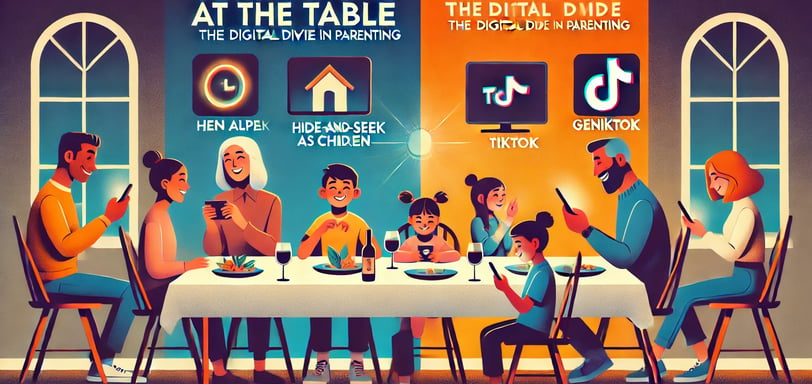Generations and Technology
Let’s imagine two families sitting down to dinner. In one family, the parents — millennials — fondly recall their childhood evenings playing hide-and-seek in the neighbourhood, while their kids, who are in the Gen Alpha camp, are more interested in discussing the latest update to their favourite game. On the other side of the table, an older Gen Z sibling is glued to their phone, scrolling through TikTok. It’s a snapshot of modern parenting: different generations, each with their own relationship to technology, trying to connect in a shared space.


Millennials: The Transitional Generation
Millennials (born roughly between 1981 and 1996) are a bridge between two worlds. They grew up watching technology evolve—from clunky desktop computers and flip phones to the fancy devices we use today. They still remember the days of handwritten letters and board games, but they have also embraced the conveniences of online shopping and streaming services.
For millennial parents, raising kids today can feel like standing in two places at once. On the one hand, they cherish the simplicity of their childhood and want their kids to enjoy the same outdoor play and face-to-face friendships. On the other, they know that keeping their kids away from technology entirely isn’t realistic—nor is it wise. This dual perspective makes millennials both cautious and optimistic about parenting in the digital age.
Gen Z: The First Digital Natives
Now, let’s talk about Gen Z (born roughly between 1997 and 2012), the first generation to grow up with a smartphone in their hands. Imagine a teenager – let’s call her Mia. Mia’s day begins with her phone’s alarm, followed by a little scrolling on Instagram before breakfast. She uses her laptop for school, her phone to chat with friends and her gaming console to relax. For Mia, technology isn’t a tool – it’s an extension of herself.
As members of Gen Z start to become parents, their perspective is shaped by their own experiences. They understand the power of technology better than any generation before them, and they’re quick to grasp its benefits – like online learning platforms or the way social media connects people around the world. But they’re also well aware of its disadvantages. Mia probably remembers how she struggled with self-esteem after watching the best influencers on Instagram. Parents of Generation Z bring insights like these to the table — and it's shaping how they guide their kids.
Generation Alpha: Born in the Smart Age
Finally, meet 7-year-old Sam from Generation Alpha (born since 2013). Sam doesn't know a world without touchscreens or voice assistants. His favourite toy is a tablet loaded with educational games, and he can't imagine why anyone would watch a movie on DVD when streaming exists. For Generation Alpha kids, technology isn't just a part of life — it's the air they breathe.
For their parents, it poses unique challenges. How do you teach balance to a child who sees screens as a normal part of play? How do you encourage imagination when so much entertainment is already available ready-made? Sam's parents, like many others, are learning that it's less about banning technology and more about guiding him to use it responsibly.
Bridging the Generational Gap
The differences between these generations don't just determine how they use technology—they also influence how they relate to each other. Here are some common scenarios parents may encounter:
Debates over screen time: Sam wants to spend hours on his tablet, but his Millennial parents are concerned about the effects of too much screen time. They miss a childhood in which they rode bikes and climbed trees, and they're not sure if spending hours on Minecraft can compare.
Technological literacy mismatch: Mia's Gen Z parents are tech-savvy enough to set up parental controls, but sometimes even they realize how quickly new platforms and trends emerge. For example, they may understand Instagram but have no idea about the latest viral app Sam's friends love.
Evolving parenting styles: Parenting strategies that worked a decade ago, like strict limits on device use, may seem outdated today. Instead, modern parents are finding success in methods that emphasize open communication and shared tech experiences. For example, Sam's parents might sit down with her to explore a new educational app, turning screen time into a bonding activity.
What We Can Learn
The generational gap around technology isn’t a barrier – it’s an opportunity. By understanding how each generation views and uses technology, parents can bridge the gap and create a home environment where everyone is happy. Whether you’re a Millennial parent trying to guide a Gen Alpha child or a Gen Z parent venturing into new territory, the key is empathy and adaptability.
Ultimately, parenting in the digital age means connection. It’s about finding ways to bring your family together – whether it’s a shared love of video games or the decision to split up for a family outing. By combining the best of the past and the present, you can raise kids who are not only tech savvy but also resilient, thoughtful, and grounded.
Ready to dig deeper? Let’s learn more about navigating this digital world together. Read More
Discover
Blogs to enhance your knowledge and curiosity.
Explore
Learn
info@learnerbuzz.com
© 2024. All rights reserved.
Terms & Conditions
